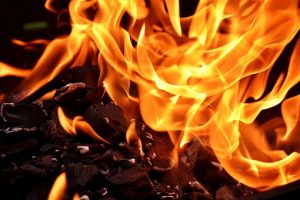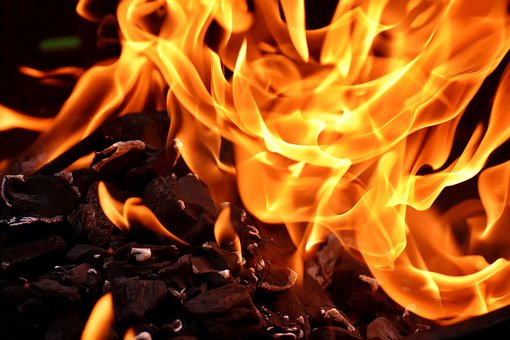 In 2nd grade, a fireman came to our elementary school for fire safety week and showed a short film about a little girl who was trapped in her second-story bedroom by a house fire. The only thing that saved her was a rope ladder her parents had installed beside her window and a German shepherd that slept at the end of her bed (he smelled the smoke while she was sound asleep). I went home that night and told my parents I needed a German shepherd and a rope ladder installed in my second-floor bedroom immediately. After six months of nightmares and relentless pleading, I got the ladder—and a miniature schnauzer five years later. I was spoiled but not completely ruined.
In 2nd grade, a fireman came to our elementary school for fire safety week and showed a short film about a little girl who was trapped in her second-story bedroom by a house fire. The only thing that saved her was a rope ladder her parents had installed beside her window and a German shepherd that slept at the end of her bed (he smelled the smoke while she was sound asleep). I went home that night and told my parents I needed a German shepherd and a rope ladder installed in my second-floor bedroom immediately. After six months of nightmares and relentless pleading, I got the ladder—and a miniature schnauzer five years later. I was spoiled but not completely ruined.
So when I learned about three Hebrew boys who were brave enough to walk into a fiery furnace rather than worship a false god, I was awed. Shadrach, Meshach, and Abednego were instant heroes. After researching them to write Of Fire and Lions, I admired them even more.
Scripture’s Truth
Let’s take a look FIRST at what I use as the foundation for every story—God’s Truth. What does the Bible tell us about Shadrach, Meshach, and Abednego?
Shadrach, Meshach, & Abednego’s Hebrew Heritage
We’re told in Daniel 1:3-4 that Nebuchadnezzar’s chief official, Ashpenaz, entered Jerusalem and took Daniel and these three young men captive. Why these four? Scripture lists the qualifications Ashpenaz was looking for:
- Without physical defect
- Handsome
- Learns quickly (intelligent)
- Well informed (wise)
- Quick to understand (thinks on his feet)
- Qualified to serve in the king’s palace (meets minimum requirements to work as an adult—or would reach the age of manhood (12-13) by the end of his training)
More Than a Name
Scripture also tells us that these four Hebrew boys were forced to give up their Hebrew names and given Babylonian names:
“Among those who were chosen were some from Judah: Daniel, Hananiah, Mishael and Azariah. The chief official gave them new names: to Daniel, the name Belteshazzar; to Hananiah, Shadrach; to Mishael, Meshach; and to Azariah, Abednego.” Daniel 1:6-7
Have you ever noticed that Daniel refers to them by their Hebrew names in chapter 2 when he’s asking them to pray with him about interpreting Nebuchadnezzar’s dream—to save all their lives from the king’s edict (2:14-19), but during the fiery furnace incident, he calls them by their Babylonian names—a scene in which Daniel isn’t even mentioned? Hmmm. More on that later.
Life in Babylon
“To these four young men God gave knowledge and understanding of all kinds of literature and learning…the chief official presented them to Nebuchadnezzar. The king talked with them, and he found none equal to Daniel, Hananiah, Mishael and Azariah; so they entered the king’s service. In every matter of wisdom and understanding about which the king questioned them, he found them ten times better than all the magicians and enchanters in his whole kingdom. And Daniel remained there until the first year of King Cyrus.” Daniel 1:17-21 (emphasis added)
Notice, these four boys weren’t just better than the rest of their classmates. There was “no one equal…[and they were] ten times better than all the magicians and enchanters” in ALL of Babylonia! Also notice verse twenty-one—only Daniel remained in Babylon—which implies that the other three were dispersed to various regions of Nebuchadnezzar’s empire. Stuff like that makes my fiction brain whirl!
Smokin’ Hot
We have no idea how many years passed between the boys’ “graduation” and when Nebuchadnezzar set up his statue in the plain of Dura. What we do know is that he summoned all the satraps, prefects, governors, advisers, treasurers, judges, magistrates and all other provincial officials summoned to that dedication—and Shadrach, Meshach, and Abednego would have been among them. They could have held any one of those jobs. Daniel, on the other hand, would have already been in Babylon—remember? (Daniel 1:21)
In the interest of time and space, I won’t go through the whole fiery furnace story here. To become more familiar with the questions I’m about to ask, you might want to read it and refresh your memory (Daniel 3).
So many questions torment my brain when I read biblical accounts. Those questions drive me to research, which sometimes answers my questions and sometimes…raises more questions! Here are a few of my questions about Shadrach, Meshach, and Abednego’s trip to the fiery furnace:
- Where was Daniel while this was happening? If he was still in Babylon (1:21) and considered one of the king’s top officials (2:48), he must have attended the dedication. Some commentators said Daniel knelt to the image to avoid the furnaces. I don’t believe it. What do you think?
- Why does Daniel call his friends by their Babylonian names while recording this story? He used their Hebrew names in chapter two, and he continues to refer to himself as Daniel throughout the narrative. Had his friends become more Babylonian in some way that caused Daniel to use their Babylonian names? Had they simply grown distant, and he was referring to them in an “official” way? What do you think?
- Nebuchadnezzar said the fourth Man in the furnace looked like “a son of the gods.” What did He look like? (Rev. 1:12-16; 19:11-16) The Babylonians had a pantheon of gods similar to those of other Mesopotamian nations, so perhaps the “son” of the gods would have been a conglomeration of the greatest qualities of them all? What do you think?
These are only three of the MANY questions I asked and use Truth (Scripture), history (fact), and fiction to answer in Of Fire and Lions.
The Rest of the Story
Shadrach, Meshach, and Abednego are never mentioned again in Scripture. However, a few historical facts led me to believe these three godly men had a profound impact on the exiles who were scattered—as were these three Hebrew boys/men—among other provinces of the Babylonian empire.
Though scattered during “the Exile” (as this seventy-year period in Babylon was called), Israel banded together to become a nation again by growing in their understanding of WHO they were as the chosen people of Yahweh. Here are some of the ways they did that:
- They were first referred to as “Jews” during this time.
- They recorded and made multiple copies of family lineages.
- They recorded and made multiple copies of the law and distributed it widely.
We have no record of how Shadrach, Meshach, and Abednego died. In Of Fire and Lions, I created a fictional explanation that coincides with a historical fact. When King Nebuchadnezzar died, his son ascended to Babylon’s throne and, in a rare display of mercy, this new king released the Judean captive-king Jehoiachin. Scholars today refuse to guess why. And I refuse to tell you how it might (fiction) have affected the lives of our three heroes—no spoilers on the day before release, y’all!
What It Means to Me
What can we learn from these Hebrew boys—giants of the faith—who then disappeared into a foreign culture to serve silently for the rest of their lives?
Throughout this study I saw God’s constant presence. When these boys were taken from Jerusalem, they’d likely been taught that Yahweh dwelt in Solomon’s Temple behind a curtain atop the golden Ark.
Imagine their surprise—and immense relief—to realize He had followed them to Babylon! Where is it you need God to follow you today? I’ve got wonderful news: He’s already there waiting and will walk with you on the journey.
Tweet-A-Licious!
- Who Were Shadrach, Meshach, and Abednego? Today, in the Whos Who series on main characters in OF FIRE AND LIONS! #OfFireandLions #OFL
- What can we learn from three Hebrew boys, who disappeared into a foreign culture to serve silently the rest of their lives? #OfFireandLions #OFL
- Where was Daniel when Shadrach, Meshach, and Abednego were in the fiery furnace? Ponder this and other questions in today’s post to prepare for tomorrow’s release! #OfFireandLions #OFL
Today’s Question:
- Is there an unanswered question about Shadrach, Meshach, and Abednego that fascinates you?




Comments 21
I think the one in the firey furnace was Jesus, walking with them to give them hope and courage!
I, too, believe that it was Jesus present in the firey furnace with the “boys” — just as He is right with us in our firey furnace times — He never leaves us or forsakes us. The visible presence of Jesus brought Nebuchadnezzer to his spiritual knees to recognize God. Got notice that my book has shipped and is arriving tomorrow — YAY — so exciting! Thank you, Mesu — God bless you 🙂
Author
Amen, Cathy! What a tremendous blessing to know Jesus is with us in our fiery furnaces even today! I’m excited you’ll have your book by tomorrow. Be sure to follow along with us for the Launch Day Palooza! We’ve got some amazing prizes! 😉
Author
I agree, Mevanee! And I LOVE your name! 😉
That is a speculation, it’s possible but can’t be proven from the Bible so I wouldn’t teach that necessarily. It is a nice idea but not necessarily true.
Daniel 3:25
He answered and said, “But I see four men unbound, walking in the midst of the fire, and they are not hurt; and the appearance of the fourth is like a son of the gods.”
Similar to Daniel 7:13
In my vision in the night I continued to watch,
and I saw One like the Son of Man (LIKE the son of man not THE son of man, he could be Jesus for sure
This is Old Testament Prophecy before Jesus. Could it be Jesus Christ? It very well could be, but the Bible makes it ambiguous for a reason I bet
Author
Kevin, you make a great point. We can’t know ABSOLUTELY that it was Jesus Christ because the Bible doesn’t explicitly say it. We can’t say definitively that the other places in the Old Testament where it says THE Angel of the Lord appeared (rather than AN angel of the Lord) are theophanies either. Thank you for helping me rein it in a little. I appreciate your gentleness as a guardian of God’s Word, brother.
The ‘teaser’ is good – the book even BETTER!!….Your Mother! Thank You. Love you ( :
Author
I love you too, Mama! So thankful for your ever-present encouragement in my life. 😉
You thought of some good questions in this article. Jesus wasn’t born yet when they were in the furnace so I have always wondered about that. But it had to be an image that the king knew was The God that they served. Amazing things happens. By the way I absolutely loved this book.
Author
Isn’t it amazing to think about Jesus showing up on earth in some sort of spiritual/physical/recognizable form hundreds of years before He was actually BORN as a God/Man on earth? Just goes to show (again) that our finite minds can NEVER put God in a box. And I’m so thrilled you loved Of Fire and Lions! I so appreciate your consistent encouragement, Brenda. You’re a blessing to me, gal!
It’s called a Christofany . Which is a pre-incarnate appearance of Christ. It was who Jacob wrestled for a blessing. Genesis32:24-31
Author
YES, Gerard! So true! And thanks for making that point! Blessings, brother.
Jesus is the Alpha and Omega, he was in the beginning and will be in the end.
Author
YES, and amen!
Jesus was not born as the physical man/God during this time; but He was part of the Trinity even from the beginning of earth/man. Gen.1:26 (let us) and in John 1:1-4 (The Word) which is Jesus and what the whole Bible is about. The Bible written by men who were given the words by God tells of Jesus appearing as a man throughout the Old Testament and then giving up His glory to come as a babe an atonement for sin in His death and resurrection in New Testament. The man in the fiery furnace is Jesus/God!
Agreed, Judith! There are many “theophanies” in the OT, and this is one. 🥰
I am a lover of reading the Word of God and like you, I’m always trying to fill in the blanks! I have many of the same questions as you. I’ve always wondered why Daniel continued to refer to himself by His Hebrew name but switched to the Babylonian names for the others.
I am currently reading Isaiah’s Daughter and look forward to reading Of Fire and Lions.
When I say love your writing, ‘love’ doesn’t do it justice. The fact that you take time to do serious research Biblically and historically allows there to be such a backbone to your books that amazes me. And to create such a piece of work that weaves the possible what-might-have-been with the truth of the Word captivates me with every book of yours I read. I’m also the type that wishes I could SEE the accounts I read in the Bible and you did such a wonderful job of helping my mind’s eye when reading Love Amid the Ashes and Love’s Sacred Song. I said I would never read the book of Job or Song of Solomon the same way again. Any chance you could give me the proper pronunciation for “Arielah”?
Now that I’ve written my own comment book, have a joyful day and thank you for what you do!
Author
Emily, I’m so touched by your kind and gracious words. What a tremendous blessing to know that my books have encouraged you in the reading and understanding of God’s Word. That, as you supposed, is absolutely the best compliment I ever receive and is, in fact, the reason I write biblical novels.
I love that you asked how to pronounce “Arielah” because I don’t exactly know! ha! I know how I say it in my head, but I’ve never actually been trained in Hebrew myself. I use a website to choose the names in my books that explains their meaning and gives their phonetic spelling. But when you asked for the pronunciation, I did what every great scholar does…I Googled it! LOL! So here’s what I found on YouTube: https://www.youtube.com/watch?v=mlbffGOAxPE. Hope that helps. Blessings on you, dear one! And thanks again for your “comment book.” 😉
Thank you for getting back with me! Love the meaning of her name ♡
1. Where was Daniel while this was happening? Wisdom tells me to look up the Name Daniel, so I did. It means, “God is my Judge.” It is a strong name. He remained at the gate of the king.
2. Why does Daniel call his friends by their Babylonian names while recording this story?
This parable is what it is. Babylonian is a world that is false. While we are shown the Babylonian names of the boys it is that they were hidden in the world as what truly what they were in the Kingdom, children of the Most High, (as the story of Esther), the fiery furnace is none other then God purifying and cleansing. The men that brought them in were killed even by being to close to the furnace. Daniel is still gate keeper.
3. Nebuchadnezzar said the fourth Man in the furnace looked like “a son of the gods.”
Here the verse says, ” Son of God.” not gods.
Author
Thanks for your thoughtful answers, Embarae. No matter how many times I read the stories in Daniel, I learn new and deeper things. May the Lord continue to teach you as you search out His wisdom in the Word of God.